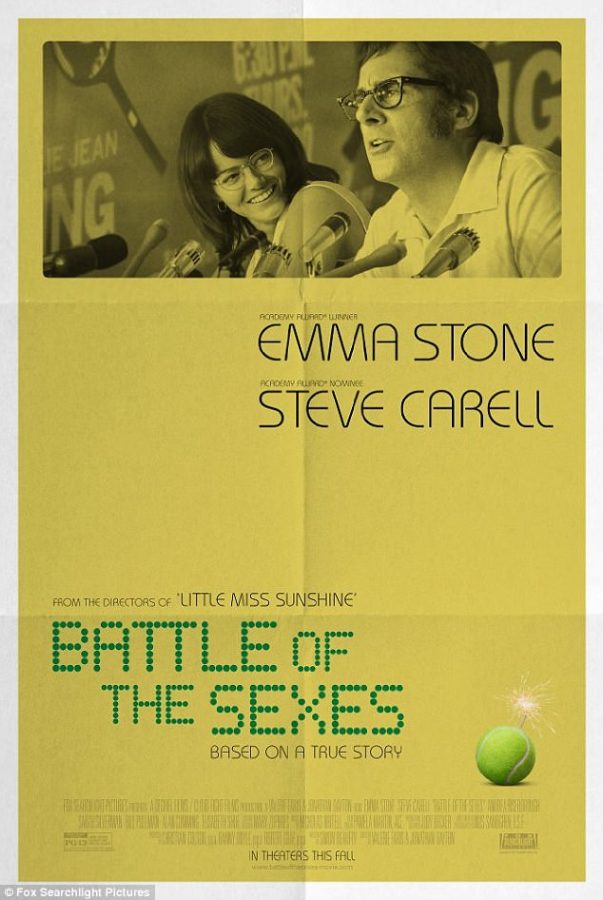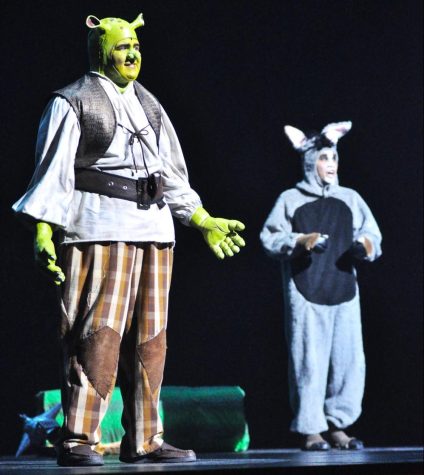Review: “Battle of the Sexes”
I have loved tennis since the day I was born, so naturally “Battle of the Sexes” was a movie I was genuinely intrigued about. I have never seen any movie centered around sports quite like this one.
Though I am saddened that I didn’t get to see the actual iconic tennis match play out, Emma Stone and Steve Carell’s reenactment of Billie Jean King and Bobby Riggs’ match was stunning to watch. Stone and Carell managed to convey the deep passion both King and Riggs have for tennis.
“Battle of the Sexes” follows Billie Jean King, one of the top female tennis players in the world, as she tries to bring equal pay to all female tennis players. She also comes to terms with the realization that she is attracted to women, a fact that nearly destroyed her career in 1981 when it was discovered that she was having an affair. King must overcome this personal challenge in order to accomplish her greater goal of battling sexism against women. To succeed, King must accept Riggs’ offer to play an exhibition match that became dubbed as one of the most important matches for women’s rights, the “Battle of the Sexes.”
Stone’s and Carell’s portrayals of King and Riggs may be the best part of the movie. Both of them share a stunning resemblance to the players, and both manage to show the contrasts in humanity in their characters. For King, it is the emotions surrounding the illegitimacy of her affair with hairdresser Marilyn Barnett (Andrea Riseborough). These emotions contrast the confident and strong persona people saw on the court. For Riggs, it is his love for his family that is masked by his love of gambling.
Another great part of the movie is the style in which it was shot. The directors did a great job of making the 1970s come alive again through the neon colors of the tennis outfits that contrasted the mellowed out tones of everyday clothing. This, combined with a plot that stayed true to King’s history, created a must-see movie.
However the movie lacks in something vital: urgency. We do not get to see King play Riggs until the very end, so we lose sight of her feminist motivations as she deals with her personal relationships. This meandering path to conclusion lead to an information-overload. Unless you are familiar with both King’s and Riggs’ history, it may be hard to follow the plot points that are jam-packed into the first half an hour.
Despite these setbacks, the quality that makes “Battle of the Sexes” an appealing movie is its unifying power. By the end, we all hope that King is successful in earning equal pay for women tennis players. In fact, Riggs is not the enemy preventing King from doing this. Her true enemy is the unlikeable Jack Kramer (Bill Pullman), a chauvinistic tennis promoter who King confronts at the beginning of the movie, and must confront again near the end.
“Battle of the Sexes” gets a well-deserved “A” for revealing the commonality of sexism, as well as highlighting the power of women. It not only entertains us with Riggs’ hilarious role of being outrageously and absurdly sexist, but it also moves us with King’s resoluteness. King is not the damsel-in-distress here. She is a strong, independent woman whose determination wins both her matches and our hearts.

Senior Maya Morriswala enjoys listening to music, playing piano and writing everything from piano solos to orchestral compositions. She plans to go to...









